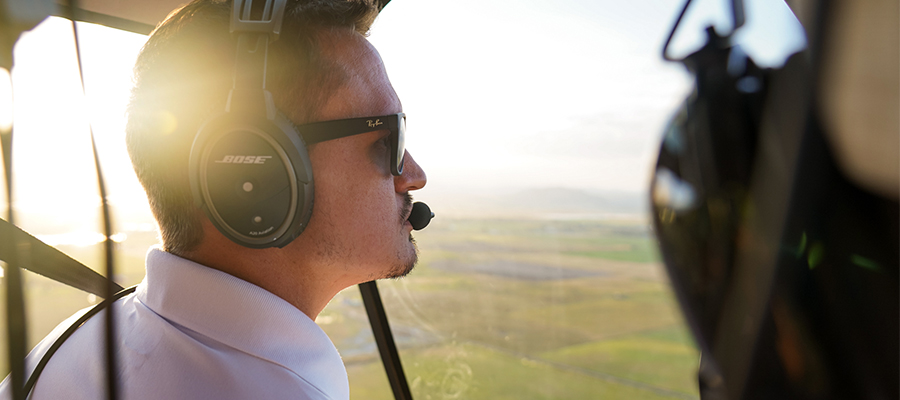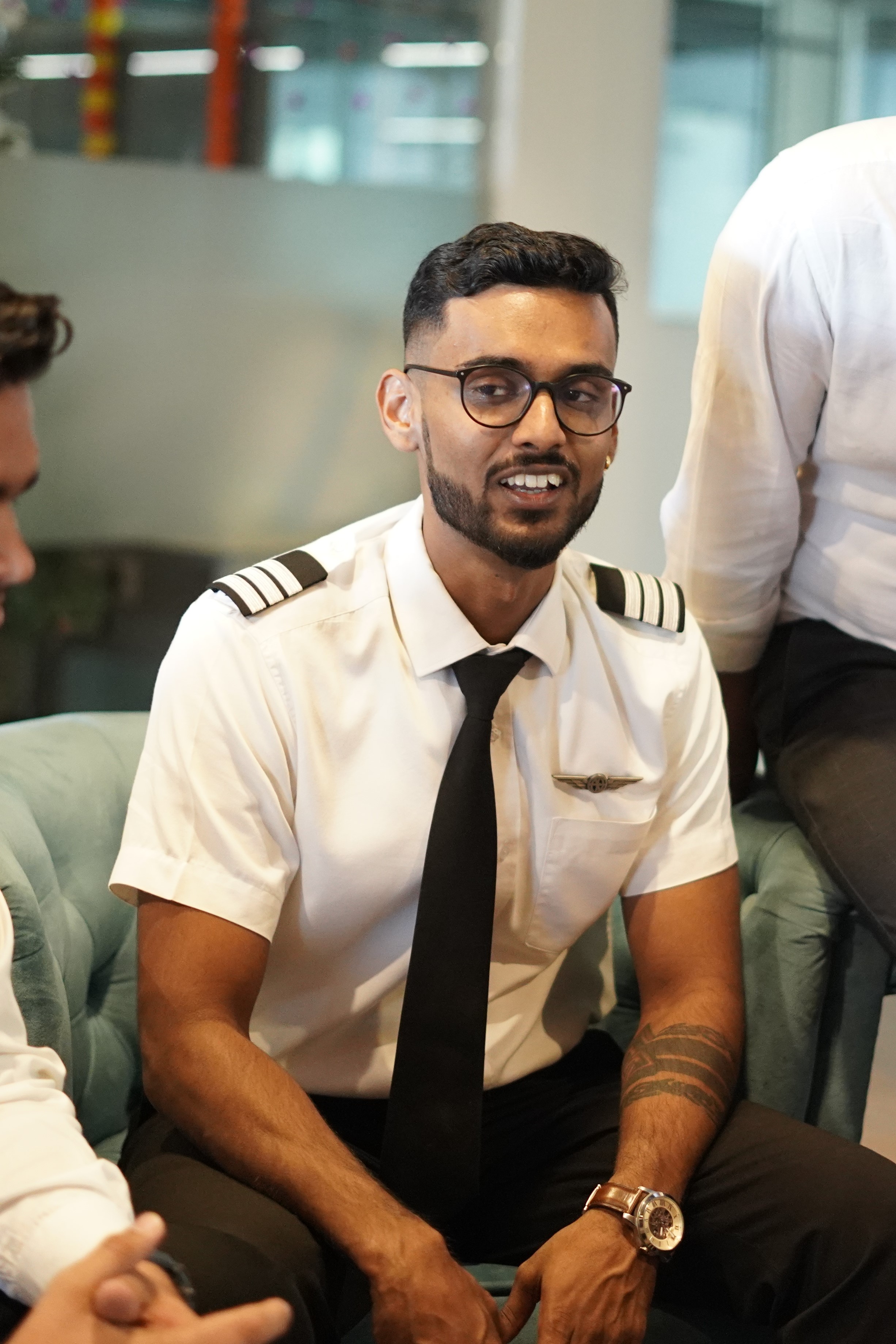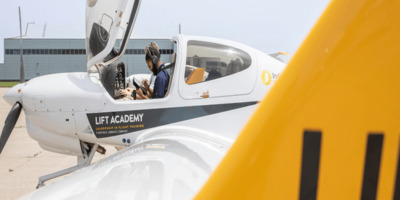
INTRODUCTION

Are you interested in becoming a commercial pilot, but are worried about the stress you might face? This blog looks into how stressful being a commercial pilot can be and offers advice on how to cope with stress as a pilot. You'll learn if the job is worth taking on and how to stay positive during stressful times. Get ready for takeoff!
The life of a commercial pilot
Commercial aviation is one of the most demanding and challenging professions, with pilots at the forefront of navigating it. With the complex safety regulations and schedules to maintain, commercial pilots bear a significant burden of responsibility. Even though being a commercial pilot offers an exhilarating and unique professional lifestyle, it can be a stressful profession at times. Long hours, unpredictable work schedules, and extensive travel can all contribute to stress. Pilots must undergo rigorous training before they are allowed to take on commercial flights. There is also constant pressure to stay up-to-date with technological advancements in aviation and adhere to strict safety measures that ensure passengers' well-being. Pilots must also work efficiently as part of a team while maintaining their focus on flying the plane safely. Despite these challenges, many commercial pilots find this career path fulfilling due to its unique benefits, such as traveling regularly to new destinations worldwide. Moreover, according to the Federal Aviation Administration (FAA), airlines have implemented various measures that reduce pilot fatigue levels considerably more than in previous years. These measures include modifications to scheduling practices as well as increased rest periods for pilots. A commercial pilot's responsibilities are like a flight path, always changing and full of unexpected turbulence.
The responsibilities of a commercial pilot
Commercial piloting involves immense responsibility, demanding an acute sense of decision making and vigilance. The job entails ensuring the safety and well-being of passengers, cargo, and crew members while navigating through adverse weather conditions. Besides this, commercial pilots are also responsible for executing pre-flight inspections, communicating with air traffic control, and adhering to strict security protocols en route. Apart from flying skills, commercial pilots require high-levels of professionalism and interpersonal communication abilities to lead a diverse team effectively while handling exigencies. Pilots are required to execute their duties under challenging conditions with a readiness to handle any unforeseen circumstances. Moreover, commercial pilots are required to follow rigorous regulations mandated by regulatory bodies governing global air traffic rules. It includes maintaining compliance records consistently and undergoing recurrent training sessions regularly. Continuous learning and upgrading skills is vital for any pilot's success. Why spend years in school when you can just fly by the seat of your pants?
The training required to become a commercial pilot
The path to obtaining a career as a commercial pilot involves rigorous training, certification, and experience. The process is comprehensive and takes time and effort. Below is a breakdown of the necessary training required to become a successful commercial pilot:
| Minimum age requirement | 18 years old. |
|---|---|
| Education requirements | Class 12th with Physics and Mathematics as compulsory subjects or equivalent is mandatory. |
| Pilot's license requirement | To become a certified commercial pilot, you will need a private pilot's license, instrument rating certification, multi-engine rating certification, and depending on the employer, an Airline Transport Pilot (ATP) certificate. |
| Total number of flight hours required | The Director General of Civil Aviation (DGCA) mandates that aspiring commercial pilots accumulate at least 200 total documented hours of flight time before qualifying for a CPL. |
n addition to these requirements, aspiring pilots must also have excellent physical health. They must pass medical exams regularly to ensure their safety and the safety of their passengers. Acquiring your wings requires hard work and dedication. While pursuing your dream may be challenging at times, it is ultimately rewarding. Remember that becoming a commercial pilot can be highly competitive in industries such as airlines. Therefore don't miss out on those valuable opportunities to maximize your chances of achieving this significant milestone! Being a commercial pilot requires more mental and physical stamina than a marathon runner with a PhD in astrophysics.
The physical and mental demands of flying
Flying a commercial aircraft involves immense physical and mental exertion. Pilots are responsible for the safety of hundreds of passengers, requiring constant attention to detail and quick decision-making skills. The physical demands of flying include long hours in the air, high-altitude exposure and exposure to radiation. Mental demands include managing complex systems, dealing with unexpected emergencies and adapting to changing weather conditions. These factors can result in high stress levels which need to be effectively managed throughout the career. Pilots must undergo regular medical exams as part of their licensing requirements. They have strict guidelines on nutrition, sleep habits and exercise routines to maintain optimal health for their demanding job. In addition to these protocols, they have access to counseling services for managing stressors that may arise from their professional lives. With appropriate support, pilots can thrive in their careers for years with minimal negative impact on their physical and mental health. A pilot's responsibility doesn't end after landing the plane safely at an airport. They have post-flight duties such as filling out paperwork, checking maintenance issues or reviewing incident reports that may occur during the flight process. This shows that being a commercial pilot is more than just flying; it is a multi-faceted profession that demands dedication, attention-to-detail and sharp cognitive abilities. According to IATA (International Air Transport Association), commercial aviation activity provides around 65 million jobs globally which make up about 3% of the world's GDP. "Danger? Pfft, we pilots laugh in the face of danger. It's turbulence that has us reaching for the barf bags."
The dangers of flying
Piloting an aircraft is a profession that requires specific skills and nerve-wracking decision-making. Aviation safety concerns are significant dangers of being a pilot. Accidents, technical failures, extreme weather conditions are examples of risks that pilots may face while flying commercial airliners. As commercial flights extend globally, so do the potential hazards. Terrorism has become increasingly prevalent, adding to the existing dangers pilots encounter daily. Pilots must also deal with other risk factors such as fatigue, physical strain, and mental stress. While most accidents occur during takeoff or landing, mid-air collisions and equipment malfunctions remain concerning risks for pilots. The responsibility of carrying hundreds of people on board is enormous, and the pressure is on. Despite rigorous training programs and regulations in place to ensure safe operations, flying remains an unpredictable activity where unforeseen circumstances may arise. It's a high-stress job that comes with immense responsibility. Recent aviation incidents such as the 2019 Ethiopian Airlines crash highlight the devastating consequences of being a commercial pilot. The overwhelming pressure faced by these professionals every day can indeed be hazardous enough to make flying one of the most stressful careers out there. Why earn a stable income when you can also get a breathtaking view from your office? #CommercialPilotPerks
The benefits of being a commercial pilot
- Competitive Salaries:One of the primary benefits of being a commercial pilot is the high earning potential. As airlines compete for skilled pilots, salaries and benefits have become increasingly lucrative.
- Travel Opportunities:Commercial pilots often travel to exotic destinations on account of their work. This provides opportunities to experience different cultures and traditions around the world.
- Personal Development: Apart from honing technical skills, commercial piloting also helps develop soft skills such as leadership, crisis management, and decision-making.
- Prestige: There's no denying the prestige that comes with being a pilot - especially one who flies internationally or for major airlines.
Beyond these advantages, there are other perks specific to various airlines that differentiate them from others. However, regardless of which airline a pilot chooses to go with, these inherent advantages remain. It's worth noting that while there may be some stress associated with this profession, getting to do something you love every day more than compensates for it. According to TheBalanceCareers.com (a leading career resource provider), "Becoming an airline pilot requires completing all required courses and exams and logging 1,500 flight hours. After gaining sufficient experience and earning necessary licenses, pilots can expect to earn solid incomes". Being a pilot means having a high-flying lifestyle, but also having to sleep in strange hotels and eat questionable airport food.
The salary and job security of a commercial pilot
| The compensation and position stability of a commercial pilot | |
|---|---|
| Average Salary | $121,430 per year |
| Job Outlook | 5% growth from 2019 to 2029 |
| Required Education | Commercial Pilot Licence |
Moreover, many airlines provide additional benefits such as health insurance, retirement plans, travel perks, and bonuses. However, some pilots may experience long work hours and frequent travel that can adversely affect their work-life balance. According to Forbes, the highest-paid airline pilot in the US is Delta Airlines captain Stephen Dickson, who earned $13.1 million in 2018 through salary and stock options. The downside of being a commercial pilot? You spend more time in the air than with your loved ones, but hey, at least the autopilot won't argue with you.
The future of commercial aviation
With rapid technological advancements, the aviation industry is evolving at an unprecedented rate. This transformation brings a gamut of opportunities and challenges for commercial aviation. In response to environmental concerns, the future of commercial aviation emphasizes electric airplanes, sustainable fuel, and carbon-neutral operations. Additionally, remote towers, AI-based air traffic control systems, and blockchain-based ticketing systems are some of the innovations that will shape the future. The proliferation of low-cost airlines and global tourism has led to an exponential increase in passenger traffic. Despite the lucrative growth prospects, numerous hurdles remain to be overcome. These include capacity constraints, ever-changing regulations and protocols pertaining to border enforcement operations along with deep-seated security concerns surrounding air travel. To address these issues, global collaboration among governments and stakeholders are indispensable. As flying has become more accessible and commonplace in recent years the demand for pilots has reached an all-time high - Further adding stresses on Commercial Pilots creating a huge demand pressure on supply-which can lead to mental burnouts if unwell managed professionally leading them under par performance when it comes to Airline Operations... In light of these developments, it is imperative that players in the aviation industry stay abreast of ever-evolving trends while adapting seamlessly to changes for sustained growth. Making strategic investments in human capital development can help equip professionals with advanced skills required to navigate this challenging terrain adequately. As we contemplate what lies ahead for commercial aviation let us not forget that as passengers or passionate employees it's immensely rewarding travelling or working within such magnificent subject matter-but only by staying relevant can you avoid being left behind in what promises to be a fascinating journey into a new decade!
Frequently Asked Questions
- Is being a commercial pilot a stressful profession?
Yes, it can be. Pilots are responsible for the lives of their passengers and crew, and they may encounter challenging weather conditions or technical problems in flight. - What are some of the most common sources of stress for commercial pilots?
Pilots may experience stress from long hours, irregular schedules, time away from family and friends, and the pressure to constantly perform at a high level. - How do commercial pilots manage stress?
Many pilots rely on exercise, meditation, and other stress-reducing techniques to help them cope with the demands of their job. - Are there any regulations in place to reduce the stress levels of commercial
pilots?
Yes, the Director General of Civil Aviation (DGCA) has established guidelines for pilot duty and rest periods to help ensure that pilots are properly rested before flying. -
Are there any risks associated with pilots experiencing high levels of stress?
Yes, high levels of stress can lead to fatigue, which can affect a pilot's ability to make good decisions and react quickly in an emergency situation -
What kind of support is available for commercial pilots experiencing stress?
Pilots can turn to their airline's employee assistance program for emotional support or to seek help for mental health issues related to stress.
.jpg)
.jpg)

Leave a Reply